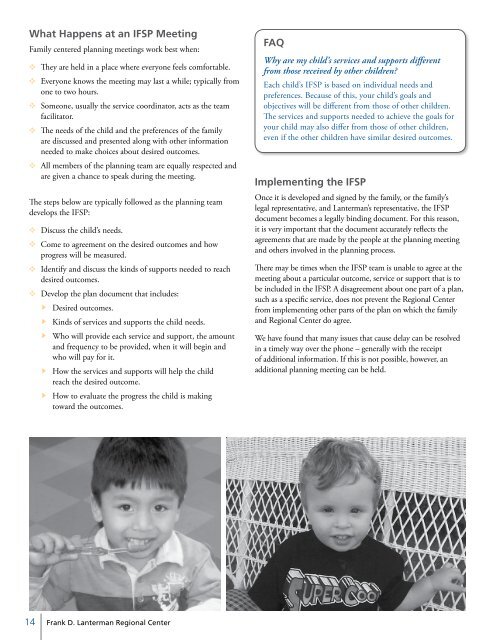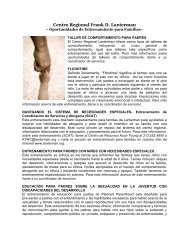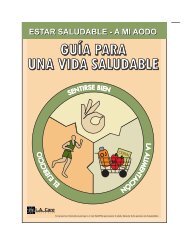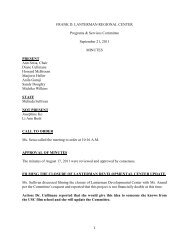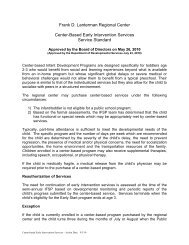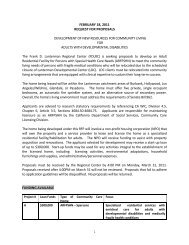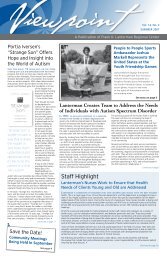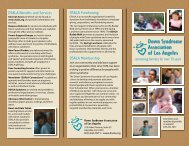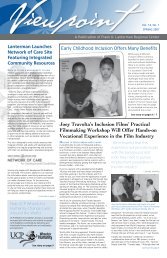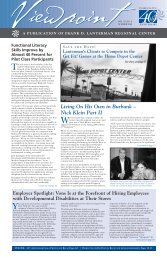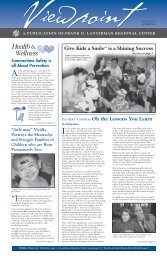Guide to Lanterman for Early Start Families - Frank D. Lanterman ...
Guide to Lanterman for Early Start Families - Frank D. Lanterman ...
Guide to Lanterman for Early Start Families - Frank D. Lanterman ...
You also want an ePaper? Increase the reach of your titles
YUMPU automatically turns print PDFs into web optimized ePapers that Google loves.
What Happens at an IFSP Meeting<br />
Family centered planning meetings work best when:<br />
v They are held in a place where everyone feels com<strong>for</strong>table.<br />
v Everyone knows the meeting may last a while; typically from<br />
one <strong>to</strong> two hours.<br />
v Someone, usually the service coordina<strong>to</strong>r, acts as the team<br />
facilita<strong>to</strong>r.<br />
v The needs of the child and the preferences of the family<br />
are discussed and presented along with other in<strong>for</strong>mation<br />
needed <strong>to</strong> make choices about desired outcomes.<br />
v All members of the planning team are equally respected and<br />
are given a chance <strong>to</strong> speak during the meeting.<br />
The steps below are typically followed as the planning team<br />
develops the IFSP:<br />
v Discuss the child’s needs.<br />
v Come <strong>to</strong> agreement on the desired outcomes and how<br />
progress will be measured.<br />
v Identify and discuss the kinds of supports needed <strong>to</strong> reach<br />
desired outcomes.<br />
v Develop the plan document that includes:<br />
Ñ Desired outcomes.<br />
Ñ Kinds of services and supports the child needs.<br />
Ñ Who will provide each service and support, the amount<br />
and frequency <strong>to</strong> be provided, when it will begin and<br />
who will pay <strong>for</strong> it.<br />
Ñ How the services and supports will help the child<br />
reach the desired outcome.<br />
Ñ How <strong>to</strong> evaluate the progress the child is making<br />
<strong>to</strong>ward the outcomes.<br />
FAQ<br />
Why are my child’s services and supports different<br />
from those received by other children?<br />
Each child’s IFSP is based on individual needs and<br />
preferences. Because of this, your child’s goals and<br />
objectives will be different from those of other children.<br />
The services and supports needed <strong>to</strong> achieve the goals <strong>for</strong><br />
your child may also differ from those of other children,<br />
even if the other children have similar desired outcomes.<br />
Implementing the IFSP<br />
Once it is developed and signed by the family, or the family’s<br />
legal representative, and <strong>Lanterman</strong>’s representative, the IFSP<br />
document becomes a legally binding document. For this reason,<br />
it is very important that the document accurately reflects the<br />
agreements that are made by the people at the planning meeting<br />
and others involved in the planning process.<br />
There may be times when the IFSP team is unable <strong>to</strong> agree at the<br />
meeting about a particular outcome, service or support that is <strong>to</strong><br />
be included in the IFSP. A disagreement about one part of a plan,<br />
such as a specific service, does not prevent the Regional Center<br />
from implementing other parts of the plan on which the family<br />
and Regional Center do agree.<br />
We have found that many issues that cause delay can be resolved<br />
in a timely way over the phone – generally with the receipt<br />
of additional in<strong>for</strong>mation. If this is not possible, however, an<br />
additional planning meeting can be held.<br />
14<br />
<strong>Frank</strong> D. <strong>Lanterman</strong> Regional Center


